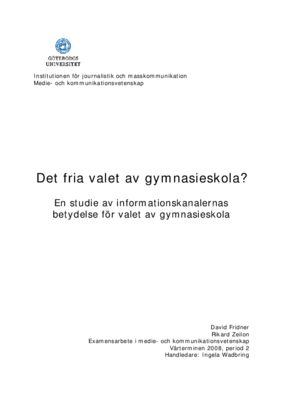Det fria valet av gymnasieskola?
En studie av informationskanalernas betydelse för valet av gymnasieskola
The free choice of upper secondary school? A study of the meaning of the information channels for the choice of upper secondary school Authors: David Fridner & Rikard Zeilon Mentor: Ingela Wadbring Questionnaire study Date: 2008-08-11 Abstract The choice of upper secondary school is a very important choice, both for the school and for the ninth grader. In Göteborg, the free choice of upper secondary school has generated several new information channels apart from the traditional counselor, daily news and the acquaintance. Today it is harder than ever to reach the pupil through the constant media noise and new forms of communication such as events appear. The fight for each pupil gets more and more important every term and it has now become real big business. Today’s youth is imprinted by a growing individuality and everyone knows that equableness is something very important. Sweden is one of the most equal countries in the whole world but still, does it matter if you are a boy or a girl when it comes to receiving and getting through all the information you obtain before the choice? An understanding about how ninth graders make their choice can only emerge when we do not get satisfied studying different information channels; we also have to study the receivers – the ninth graders. 15-year olds are on their way to become adults, but they stand with one foot on each side of the border. The individualization process is now at full speed and the ninth graders often revolt against their parents. However, the study shows that parents have a relatively big say in the choice of upper secondary school. In total matter between the diversely groups of ninth graders, parents are next after the number one element: the schools good reputation. The other information channels shown in the top five of all the 31 studied channels and elements are the two events “Gymnasiemässan” and “Öppet hus” out at the upper secondary schools, and the ninth graders friends. From all this we can see that direct contacts is the form of communication the ninth graders value as the most important ones. The results further tell us that girls more active search for information while boys, and especially the ones from the areas with the lowest resources, settle their choice much faster. One of the most interesting data from our study is that no single information channel has a major influence on which school the pupil will apply. Instead our survey indicates that the pupil listens to many different information channels before deciding rather than just depending on one or two.

